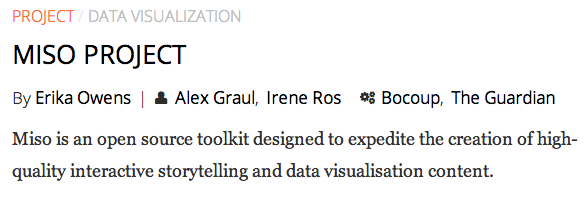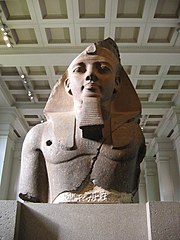Half sunk, a shattered visage lies, whose frown,
And wrinkled lip, and sneer of cold command,
Tell that its sculptor well those passions read
Which yet survive, stamped on these lifeless things,
The hand that mocked them, and the heart that fed;
And on the pedestal these words appear:
“My name is Ozymandias, king of kings:
Look on my works, ye Mighty, and despair!”
I have a confession to make: my personal portfolio misrepresents the true nature of my work. Like most portfolios and CVs, it is a monument to my personal achievements. The truth is that I’m not a solitary creator. I’m incredibly lucky and happy to participate in a wonderful network of people, communities, and inspiration– a network that includes my readers as well. But with natematias.com as my domain name, I do a terrible job of presenting that reality.
I’m not alone. Most of the Web isn’t structured to celebrate networked creativity. I want to change that by making an acknowledgment layer for the Web. Over the next few months, I’ll write more posts about the system as I design it.
Note: In this post, you can react to any part of the post by highlighting the text and clicking “React To This.” I would love to see your comments and further reading suggestions. Thanks Readrboard!
Most web applications are fundamentally egocentric. YouTube only associates videos with the account that uploads it. WordPress and Drupal only let you acknowledge one author of a blog post unless you install third-party plugins. Github automatically credits anyone who contributes code but doesn’t easily acknowledge people who contribute ideas. Creative Commons licenses require you to attribute the person who uploaded a project, not always the people who created it. Only a few sites, like Vimeo and Mozilla Open News, permit users to acknowledge the people and organisations involved in a project. Here’s a screenshot from the Mozilla site:

The Mozilla Open News site acknowledges writers, contributors, and organisations.
Acknowledgment: Duty or a Party?
Discussions about acknowledgment often focus on the idea of authors and the credit they deserve. Content curator Maria Popova recently proposed the Curator’s Code for Twitter attribution, arguing that we need to respect curation as “a form of authorship.” While Maria is right that we should acknowledge curators, this idea of authorship is narrowly concerned with self interest rather than the beauty and fun of creative cooperation. As a result, most people see acknowledgement as a duty– especially if they feel they’re not being properly acknowledged. That’s boring. The best acknowledgment is a party, a celebration of collective identity and creativity.
Acknowledgment is a speech act which has legal, social, and moral consequences. In their paper, “The Evolution of Authorship in a Remix Sociedy” (pdf), Diakopoulous, Luther, Medynskiy, and Essa describe issues closely connected to acknowledgment and authorship online:
- legal codes about copyright and plagiarism
- business models and economics
- community and social norms
- authority and reputation
- originality and remix
When we examine these issues from the standpoint of authorship, it’s only natural to focus on self-interest. We want to claim originality, to have the right to control how our work is shared, to be respected, and to get paid for our work. While they are all important, these standpoints position acknowledgment as something to be expected or demanded rather than something to be given.
One way to escape the egocentrism of authorship is to avert our gaze from authors entirely to focus on the complex structure of quotation, allusion, and inspiration within creative works themselves:
a text is… a multi-dimensional space in which a variety of writings, none of them original, blend and clash. The text is a tissue of quotations drawn from the innumerable centres of culture.
–from “The Death of the Author” (pdf) by Roland BarthesAs a longtime maker of hypertext systems in the tradition of Ted Nelson, Doug Engelbart, and Vannevar Bush, I love this idea. If we trace the connections, edits, and remixes in our projects, we can arrive at an honest, automated acknowledgement of people’s contributions. Research in the fields of Computer Supported Cooperative Work, reflective practice (pdf), source code repositories (youtube), and forensic digital humanities takes this approach.
Although I find it endlessly fascinating, I don’t think this is the right direction. Rights management systems often make mistakes. Worse, automated acknowledgment is limited to contributions that software can track. Finally, while information structures can be amazingly beautiful, an impersonal focus on artifacts is blind to the joys of cooperative relationships.
Peer production, a model of creativity via mass collaboration, offers another escape from egocentric notions of creativity. Sites like Wikipedia are larger and less personal than the relationships of cooperation I value. Nevertheless, I’m hoping to draw extensively from insights in research on peer production.
Andrés Monroy-Hernandez and Benjamin Mako Hill discovered a powerful principle about acknowledgment while developing the online platform for Scratch, a creative publishing platform. Scratch permits users to remix each others’ work and is able to track those remixes across the platform. In his talk this year on Designing for Remix, Andrés discussed his research with Mako on remix attribution (pdf). When some community members were unhappy about unattributed remixes, Andrés added automatic attribution to Scratch. Users were still dissatisfied. Meaningful acknowledgment, they discovered, cannot be given automatically. Scratch users valued acknowledgement more highly when other people took conscious action to acknowledge them.
A system which acknowledges the beauty of cooperative relationships can’t be based on the impersonal idea of hypertext or the egocentric notion of authorship. It can’t rely on licenses to threaten people into acknowledging each other. Instead, we need an aesthetic of acknowledgement that values relationships and revels in the joy of working with people who inspire us. Acknowledgement should be intrinsically exciting and fun, a gift and a party rather than a duty.
An Acknowledgment Platform for the Web
Instead of pairing acknowledgment and credit with the user account that controls content publication, web apps should support people to acknowledge each other freely. Publishing systems should treat cooperation as a top-level element. Next to individuals and creations, we should also display collaborations. The outcome will be more honest and more fun.
To start, I’m redesigning my personal portfolio. In the medium term, I’m developing a system akin to Gravatar and Lanyrd for acknowledging people for their contribution to projects. In the meantime, I would love to hear your thoughts.
![]() Google ChromeScreenSnapz199.png
Google ChromeScreenSnapz199.png
media
social networks
technology solutions


